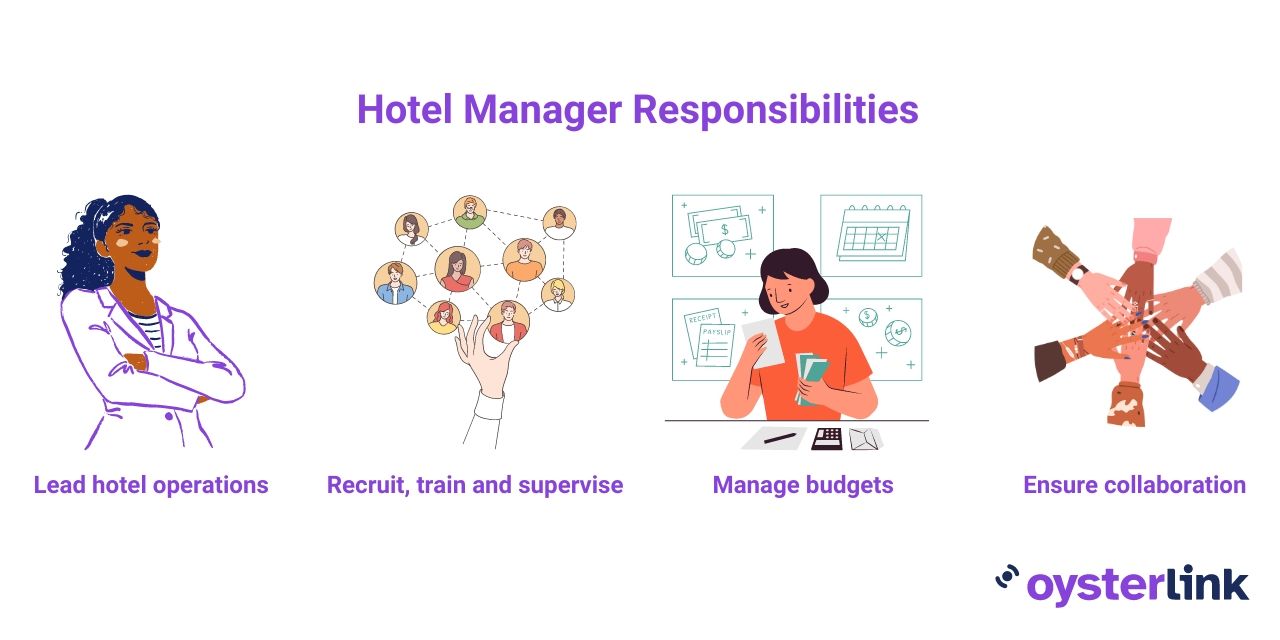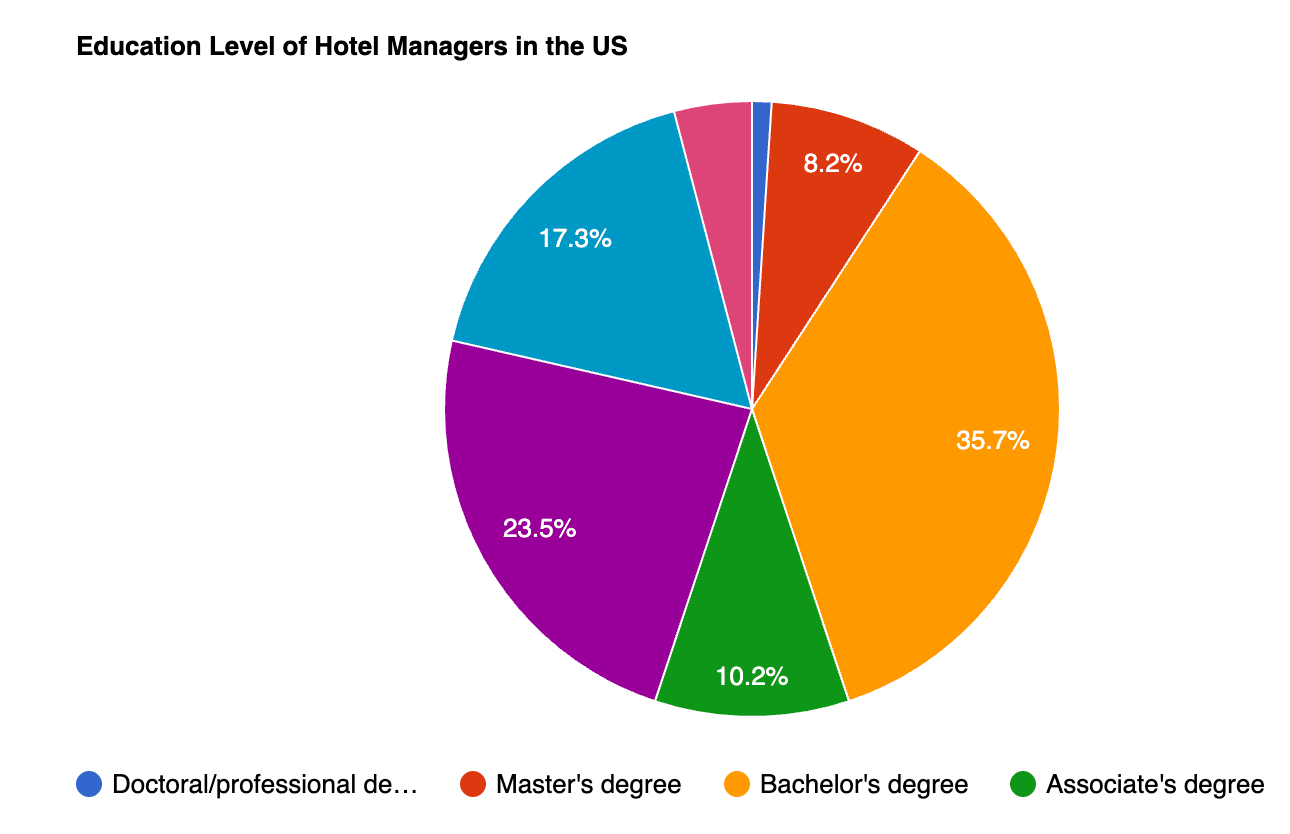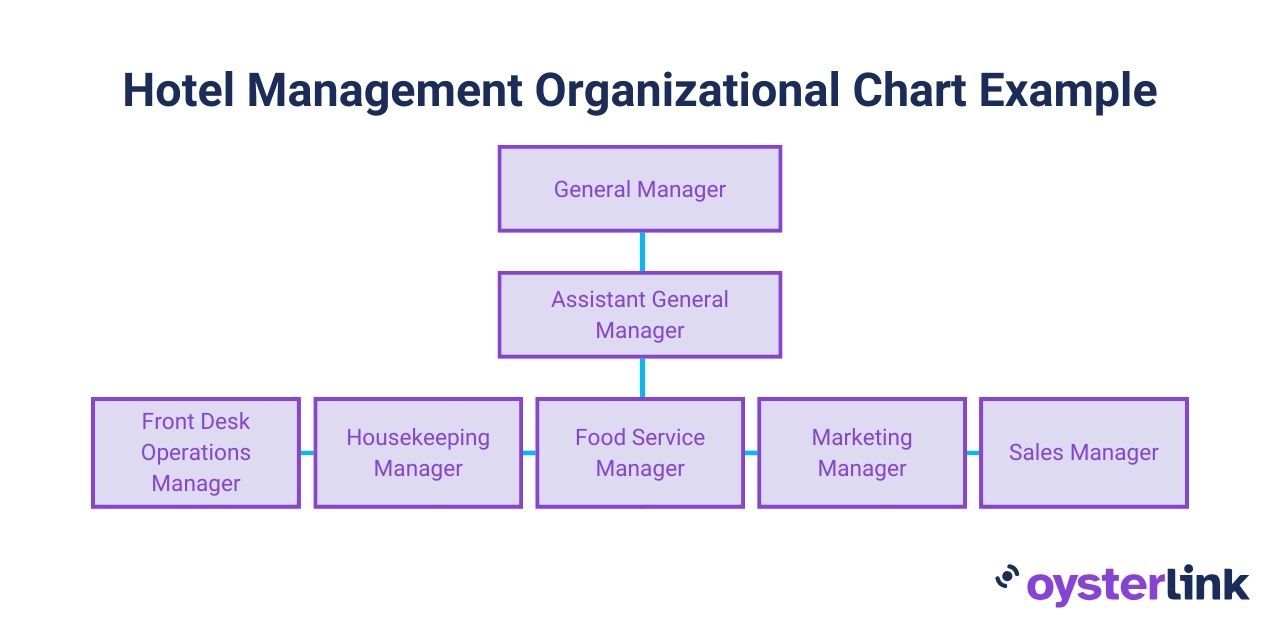Hotel Manager Career Guide
Exploring a career as a Hotel Manager is among the highest and most rewarding paths in the hospitality industry you can take. If you’re interested in hotel management, this guide will provide the information you need to get started and excel.
What Is a Hotel Manager?
Hotel Managers, also known as Front Desk Managers, Front Office Managers, Guest Relations Managers or Night Managers, are employees who handle the daily operations of a hotel or facility.
They guide their teams, delegate tasks and supervise all operations. To be successful in hotel management, you must have ambition, leadership skills and excellent customer service.
What Does a Hotel Manager Do?
A Hotel Manager’s responsibilities vary depending on the size of the establishment’s operations. Hotel Managers for large establishments focus on delegating tasks. Meanwhile, those in smaller establishments, like a boutique hotel, are more hands-on with their staff.

Hotel Managers are assigned a mix of operational and strategic responsibilities as follows:
- Oversee daily hotel operations and manage front desk, reservations, check-ins and check-outs
- Hire, train, schedule, supervise and communicate effectively with hotel staff
- Maintain high service standards and resolve guest complaints
- Prepare budgets, monitor expenses and analyze financial management reports
- Develop marketing strategies based on industry trends to build client relationships and increase profitability
- Coordinate with maintenance and manage renovations for guest rooms and other facilities
- Adhere to health and safety laws and other regulations
- Manage supplies and negotiate contracts with vendors
- Create programs to improve guest experience and handle VIP requests
- Oversee hotel management software and implement new systems
- Generate reports for owners or senior management
- Coordinate with department heads to ensure smooth operations
- Implement eco-friendly practices and manage energy use
What Is the Work Environment of a Hotel Manager Like?
Hotel Managers are employed in both small and large hotels, where they manage and oversee other hotel employees and interact with guests. They typically have their own office and may work mornings, afternoons, evenings and nights. The role also sees them often walking the hotel and conducting quality checks and inspections.
Other hotel workers may turn to the Hotel Manager when there’s an issue to resolve or a situation to be dealt with. Even when not at work, some Hotel Managers may have to be available at all times in case of an emergency.
What Are the Requirements To Become a Hotel Manager?
As you can see in the Hotel Manager jobs listed on our website, most hotels require a mix of education, credentials and experience when hiring an individual for this role. Becoming a Hotel Manager would likely require up to five years of experience in the hospitality industry.
Hospitality management and business administration courses can also equip you with important skills for hotel management.
However, although 35% of Hotel Managers reported having a bachelor’s degree, higher education is not mandatory. A high school diploma or equivalent is normally required for Hotel Managers.
When hiring an individual for this role, the establishment will always list all educational and experience requirements in their Hotel Manager job description.

[Source: CareerOneStop]
See also: How To Become a Hotel Manager: Step-by-Step Guide
What Skills Does a Good Hotel Manager Need?
It takes impeccable leadership skills to manage hotel staff and keep all day-to-day operations running smoothly. A good Hotel Manager is able to delegate tasks and communicate effectively with the rest of the team.
Since Hotel Managers often interact with guests directly, they also need strong customer service skills. They should be patient and empathetic and know how to resolve conflicts with guests, which are inevitable in the hotel industry. It’s also important to know how to accept criticism and react appropriately when receiving feedback, whether it’s positive or not.
Some duties of a Hotel Manager also require them to be good at handling money and creating financial reports. They should also be able to consider financial implications when resolving guest complaints.
Given the responsibilities that come with the role, Hotel Managers should also have good decision-making and problem-solving skills.
With so many unexpected situations that can arise at any time, Hotel Managers need to be highly adaptable. To be able to resolve all situations and still complete their daily duties and responsibilities, they need to know how to multitask effectively.
Lastly, Hotel Managers should be aware of all relevant laws and regulations that govern the hospitality industry. This includes employment laws, licensing requirements, health and safety standards and everything else that ensures the hotel operates in full compliance with regulations and avoids legal issues.
When applying for a Hotel Manager job, consider putting these key skills on your resume, among other relevant skills for the hospitality sector.
You can also read Hotel Manager interview questions most employers ask and come up with your answers in advance.
What Is the Average Salary of Hotel Managers in the United States?
As per the Bureau of Labor and Statistics, the average Hotel Manager salary in the United States (U.S.) is $76,790 per year or $6,399.17 a month, making it one of the best-paying jobs in the hotel industry.
The mean annual wage for Hotel Managers has been on an increasing trend, rising by almost 21% since 2019.
For more information on Hotel Manager salaries, check out our breakdown of Hotel Manager salary trends.
What Is the Career Path for a Hotel Manager?
The hospitality industry offers many career growth opportunities, especially for Hotel Managers. Here are four career paths to consider whether you’re new or already looking to climb:
- Advancing to larger properties: Start by managing a small hotel and, with experience, move on to larger hotels, hotel chains or luxury resorts. Each step up usually comes with increased responsibilities and higher compensation.
- Specializing in a specific department: Gain expertise in a department such as food and beverage or sales and marketing. This can lead to higher-level hospitality positions within that department, such as Director of Food and Beverage or Director of Sales.
- Pursuing corporate roles: Transition from on-property to corporate positions within a hotel chain. These positions involve overseeing multiple properties and implementing company-wide strategies. Some corporate roles include Regional Manager, Area Manager or Corporate Director of Operations.
- Continuous education and certifications: Enhance your qualifications through degrees or certifications. This can open up opportunities for more executive roles, such as Hotel General Manager or even CEO, within the hospitality industry.

Although hotel management is a feat in itself, there are still more specialized and higher-level positions that you can aspire for.
Example Career Paths for Hotel Management
7 Different Types of Hotel Managers
With a hotel depending on hundreds if not thousands of small tasks for its day-to-day operations, various departments within the hotel need strong leadership. This results in larger hotels employing several types of Hotel Managers.
Each of these lodging manager roles has its own duties and pay grade, so consider which position is the most suitable and rewarding for you.
1. Front Desk Operations Manager
Front Desk Managers guide and mentor Receptionists, Concierges and other front desk staff. They manage all front desk operations such as registration, room assignments and other guest services.
They play a crucial role in managing guests’ first impressions and ensuring guest satisfaction.
2. Housekeeping Manager
Housekeeping Managers (sometimes called Executive Housekeepers) supervise the cleaning activities of all Housekeepers on the hotel premises. They also assist in the recruitment of housekeeping personnel and lead their training and supervision.
3. Guest Services Manager
In most cases, a Guest Services Manager is a combination of the Front Desk and Housekeeping Managers. This is because they supervise various departments with essential, guest-facing functions — such as room reservations, check-in and check-out, concierge, luggage handling and housekeeping.
As their role title suggests, a Guest Services Manager in a hotel is responsible for upholding excellent service standards and resolving any matters or inconveniences that could affect a guest's stay.
4. Food and Beverage Manager
Think of the Food and Beverage Manager (otherwise called a Food Service Manager) as a Restaurant Manager for the entire hotel or resort. They oversee all food and beverage service within the property, which includes not only dining and drinking outlets but also in-room dining and banquet operations.
Food and Beverage Managers also work closely with Head Chefs and other kitchen staff to ensure adherence to health and safety standards, cost control and quality management.
5. Marketing Manager
Marketing Managers in hotels and resorts develop communication strategies for guests, partners and other stakeholders. They are also in charge of building partnerships and organizing events and campaigns both within and outside the hotel.
6. Guest Experience Manager
Not to be confused with the Guest Services Manager, a Guest Experience Manager in a hotel or resort is mainly focused on enhancing the guest's stay. As such, their job usually involves strategizing and executing services, interactions and events that result in a more personalized experience for guests.
Guest Experience Managers work cross-functionally with other departments — such as food and beverage, front desk and even spa services — to ensure cohesiveness in projects and initiatives.
For instance, the Guest Experience Manager is spearheading a promotional event like a New Year's Eve party at the hotel's rooftop bar. They would then have to work closely with the Event Manager, the Marketing Manager and the Food and Beverage Manager to ensure this party gets enough attendees, boosts the hotel's profits and goes smoothly.
7. Sales Manager
Hotel Sales Managers are responsible for finding and getting clients and building partnerships. They are in charge of creating sales proposals, managing budgets, negotiating contracts and meeting sales targets for the property.
Are you hiring for a more specific Hotel Manager role in your company? Check out our Hotel Manager job description templates.
Pros and Cons of Being a Hotel Manager
Leadership in hospitality might not be for everyone. However, if you choose to become a Hotel Manager, here’s what you can expect in terms of advantages and disadvantages.
Pros
- A clearly defined career path: Hotel management provides a structured progression path and lots of opportunities to advance into higher, better-paid roles.
- Variety of responsibilities: The role involves a wide range of tasks, from managing other workers to interacting with customers, making the Hotel Manager’s job highly dynamic.
- High salary: A Hotel Manager ranks high in the hotel industry and, therefore, receives a higher average annual salary than individuals in lower-ranking roles.
- Networking opportunities: The role involves working with other industry professionals, which opens plenty of doors for career progress.
- Personal development: The dynamic nature of the job also fosters personal growth and helps gain skills that are highly valuable in the sector.
Cons
- Long and irregular hours: To keep the hotel running smoothly, Hotel Managers sometimes have to be on call 24/7 to deal with emergency situations.
- High-pressure situations: Hotel Managers often have to handle high-stress situations, such as resolving complaints and disputes between other staff members.
- Physically and mentally demanding workload: The role involves spending a lot of time on your feet and requires a high level of attention.
Career Advice From Hotel Industry Leaders
Effective hotel management is more than just about overseeing daily operations and enhancing services to provide guests a memorable stay; it's also about fostering a positive work environment and inspiring your team to perform at their best.
That's why we've asked leaders in the hotel industry for their key insights that you can use to grow and succeed in your Hotel Manager career.
On hiring the right people for your team:
"When it comes to work-life balance, the secret is not in what you do and how you do it, the secret is what people you hire, train and mentor.
When you have a well-functioning team [who can effectively] manage the property while you are out and pass the information to you when you come back, your work-life balance will be immaculate.
Knowing that you can completely rely on your team members will give you the peace of mind that you need to enjoy your free time."
Selin Soliman, Regional Vice President at Shaner Hotels in Florida
On training staff to stay up-to-date with industry practices and standards:
"For frontline workers, we prioritize industry updates through monthly department meetings and daily morning briefings. These sessions cover relevant topics specific to their roles, ensuring they’re up-to-date and equipped to handle their tasks efficiently.
Our goal is to keep everyone informed and secure in their roles while being proactive in addressing external factors that may affect our business."
On knowing whether a workplace is the right fit for you:
"One question applicants often ask me [as an HR Director] is, 'What’s the company culture like?' If a company takes time to talk about their workplace culture and [how they] include employees in important conversations, that’s a green flag — it shows they care about their people."
Carolina Franco, Human Resource Director for Renaissance Hotels
P.S. — Check out more of OysterLink's interviews with various hospitality industry professionals.
